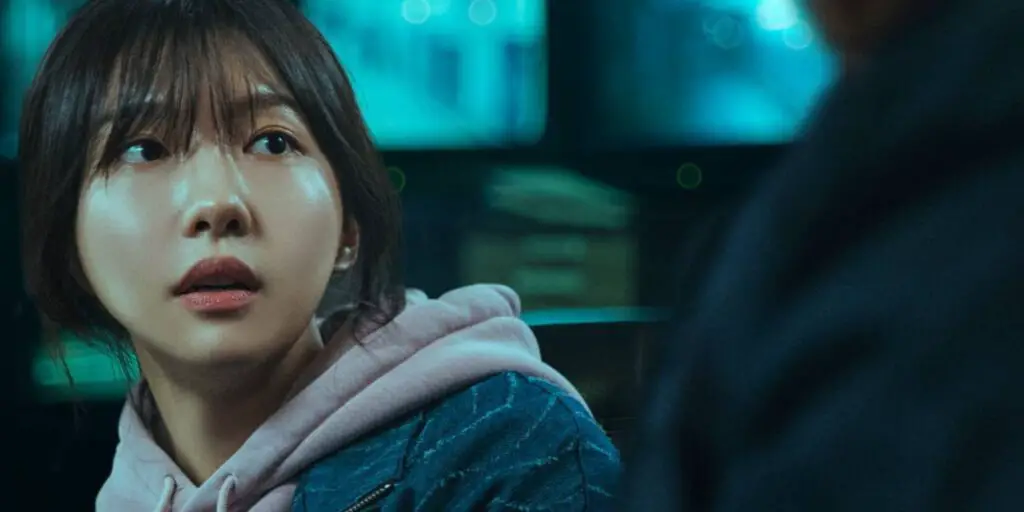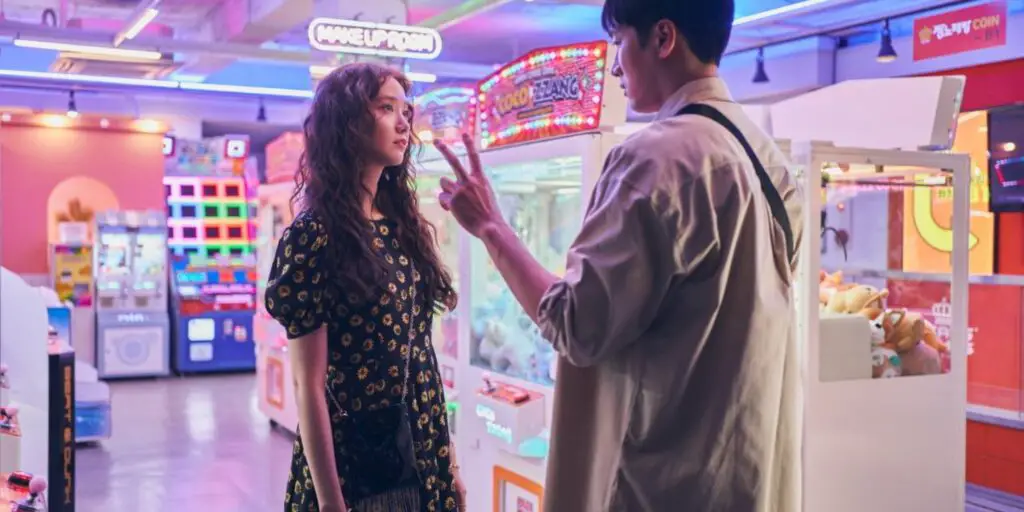Da-kyung is a horror YouTuber. She doesn’t get many views. Still, she keeps posting videos. She’s looking for a real story. Something that can change her luck.
This setup taps into a relatable modern struggle: the desperation of content creators in an oversaturated market. Da-kyung’s quest isn’t just for scares; it’s a fight for relevance and survival in the digital age, immediately grounding the supernatural premise in a tangible, contemporary reality.
Ghost Stories and the Haunting of Gwanglim Station
One day, she meets the stationmaster of Gwanglim Station. This station isn’t normal. It’s quiet. Cold. Feels like it’s stuck in time. The stationmaster tells her ghost stories from the past. Strange things happened there. People went missing. Weird shadows. Scary whispers.
These tales likely draw from Korea’s rich tradition of ‘jeon’ (傳) – local legends and ghost stories often tied to specific places and historical traumas. Gwanglim Station becomes a modern ‘haunted place’ (yuhaengji), suggesting its darkness stems from unresolved collective grief or societal neglect, a common theme in effective K-horror.
Da-kyung listens. Then she starts filming. She follows each story. As she goes deeper, the stories feel more real. She’s not just filming anymore. She’s part of the stories.
The stationmaster, played by Jeon Bae-soo, shares each tale slowly. And soon, Da-kyung starts to notice something. People she meets are also part of these stories. The border between fact and fiction disappears. It’s not just one ghost story. It’s many. The film follows an omnibus format. Each part is a short ghost story, like a train with many cars. Each one has a different tale. But all are linked to Gwanglim Station.
On paper, it sounds scary. But it doesn’t always work that way. Some moments feel off. The ghost stories aren’t very scary. A few even make you laugh. That’s not what the movie is aiming for. It tries hard to be a serious horror. But it leans toward B-grade horror comedy instead.
The biggest issue? The fear doesn’t last. The tension drops quickly. It builds up, then falls flat. It’s not the actors’ fault. The problem lies in the writing. Some dialogues feel forced. They don’t sound like how people talk. They feel like lines written for a stage, not real speech.
Where It Shines — And Where It Slips
Joo Hyun-young plays Da-kyung. This is her first lead role in a feature film. She’s known for comedy skits. Here, she tries something new. She does well in parts. Her cheerful tone fits Da-kyung’s personality. But it’s hard not to see her past characters in this role.
Still, she brings a bit of charm to the movie. Her frustration with her channel. Hyun-young’s nervous excitement when she finds clues. Her awkward fear. These moments feel honest. But the character Da-kyung isn’t written deeply. We don’t know enough about her to truly care.
The film was invited to the ‘Midnight Passion’ section at the Busan International Film Festival. That gave it early attention. But it may not live up to that promise. Especially for fans who love serious horror.
The movie tries to balance many things—fear, mystery, and character stories. But it often drops one while focusing on another. The final twist also feels sudden. It shakes up the story but doesn’t feel fully earned. It adds drama but makes the rest of the plot feel thin.
This film isn’t just one long horror tale. It’s a set of smaller stories. Some good, some weak. That’s the main problem. There’s no strong thread to tie them all tightly. There’s potential here. The idea is good. A strange station. A YouTuber looking for ghost tales. Real people are becoming part of those stories. But the delivery misses the mark.
The visuals are decent. The tone is right. It’s eerie, cold, and dark. But without strong fear or believable pacing, it can’t hold your attention for long. The dialogue also pulls you out at times. It tries to sound serious, but ends up sounding odd.

Despite its flaws, ‘Ghost Train’ offers something different. It’s not a haunted house or a cursed object story. It’s about people, memories, and forgotten spaces. That’s where it’s strong. But horror fans expecting deep scares or tight writing may walk away disappointed.
Final Thoughts
Ultimately, ‘Ghost Train’ serves as an interesting case study. It demonstrates the difficulty of balancing anthology scares with a compelling central narrative, the importance of authentic dialogue in sustaining horror immersion, and the fine line between eerie atmosphere and unintentional comedy.
While it may not satisfy hardcore horror fans seeking relentless terror, it offers a glimpse into the creative ambition – and pitfalls – of trying to refresh classic ghost story traditions for a new medium (YouTubers) within a distinctive Korean setting.
‘Ghost Train’ has charm and strange beauty. But it doesn’t fully work as horror. It’s more of a light mystery with ghost story themes. You might enjoy it if you like odd, experimental horror films. But don’t expect to be scared. Still, if you’re into Korean horror movies about ghost stories, it’s worth watching once. You’ll see a new take on the genre. Just don’t expect too much fright.
Our small team pours their hearts into every K‑drama recap. Keeping this site alive isn’t easy — if our work brings you joy, please buy us a coffee. Every little bit helps us keep the lights on ❤️

Want to earn while you shop?
Sign up on Rakuten using my referral link and get cashback + a bonus when you shop online from brands like Shein, Walmart, and more.
🛍 Join Rakuten & Get CashbackThis is my personal referral link — you get a bonus too when you sign up!
Kavita Mishra is a dynamic writer and passionate Korean entertainment enthusiast, combining her love for K-pop and K-drama with a flair for storytelling. With a keen eye for the latest trends, Kavita crafts articles that capture the pulse of K-pop idols, chart-topping hits, and the most buzz-worthy dramas taking over screens worldwide.


